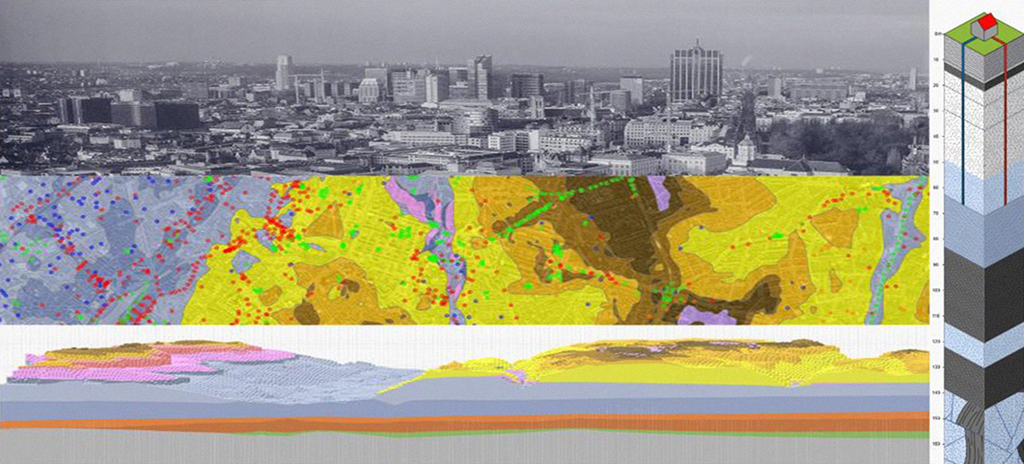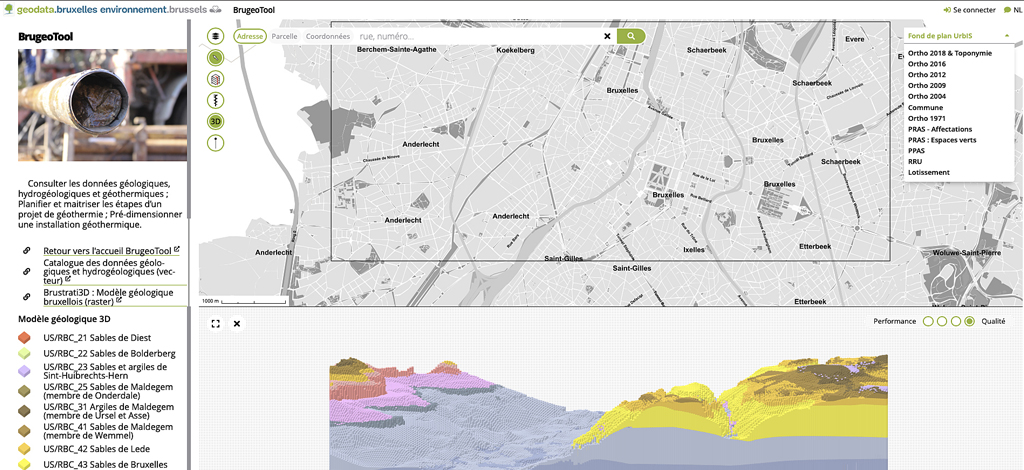BrugeoTool, an application to promote geothermal energy in Brussels
The BrugeoTool, which was launched at the end of 2020 as part of the ERDF BruGeo project, will facilitate the development of geothermal energy projects in the Brussels-Capital Region.
Shallow vertical geothermal energy systems can be used to heat and cool buildings (housing, industrial sites, offices, etc.), in combination with a heat pump. This clean, renewable energy source has several advantages: it is available almost everywhere, is produced only when energy is needed, and does not require transport, as the energy is consumed where it is produced. In a correctly dimensioned system, geothermal energy thus can be regarded as an inexhaustible energy stock, delivering the heating and cooling demand for buildings. As such, it can play a role in the ‘decarbonation’ of the energy mix.
In Brussels, however, the development of geothermal energy to date has been hampered by a lack of knowledge of the technology and of data on the nature of the subsoil.
Developing geothermal energy in Brussels with BruGeo
The BruGeo project is designed to promote and facilitate the use of shallow geothermal energy systems in the Brussels-Capital Region (BCR). It is financed by the European Regional Development Fund (ERDF) and coordinated by the Building, Architecture & Town Planning lab (BATir) of the Université libre de Bruxelles. The intervention of the ERDF Programme covers 970,000 euros (out of a total budget of 1,080,000 euros), of which 50% comes from the European Union and 50% from the BCR.
Providing the necessary information to geothermal projects
To facilitate the use of geothermal energy in the BCR, Bruxelles Environnement, in partnership with the Université libre de Bruxelles (ULB), Vrije Universiteit Brussel (VUB), the Geological Survey of Belgium and the Belgian Building Research Institute, has conceived, developed and put the BrugeoTool application online.

This app, which is aimed at technical experts (design consultancies), geothermal project managers and any interested citizens, provides a set of information necessary for setting up geothermal projects. The intuitive and well-designed interface makes it possible to better estimate the feasibility of a shallow vertical geothermal system, to plan the various stages and to control the risks.
Based on the address of a plot in the BCR, detailed information can be obtained about the nature of the subsoil and its geothermal properties, the presence of aquifers and their depths, the risk of pollution in the subsoil or the presence of other geothermal installations nearby, using 1D, 2D and 3D visualisation tools.
The app also gives users access to a predimensioning tool for geothermal installations as well as to a series of standard sizes for different classes of buildings that are representative of the segmentation of buildings in Brussels.
BrugeoTool also offers interesting functionalities for geoscience and construction professionals, facilitating the detailed exploration of geology, hydrogeology, environmental constraints depending on location, or certain in-situ test reports in the Brussels-Capital Region.
Pierre Gerard, lecturer at the ULB and project coordinator, explains that “developing tools that meet the needs of professionals is part of the university’s mission. The BruGeo partners hope that this application will ultimately meet the needs of industry players and contribute to the development of geothermal energy in Brussels”.




